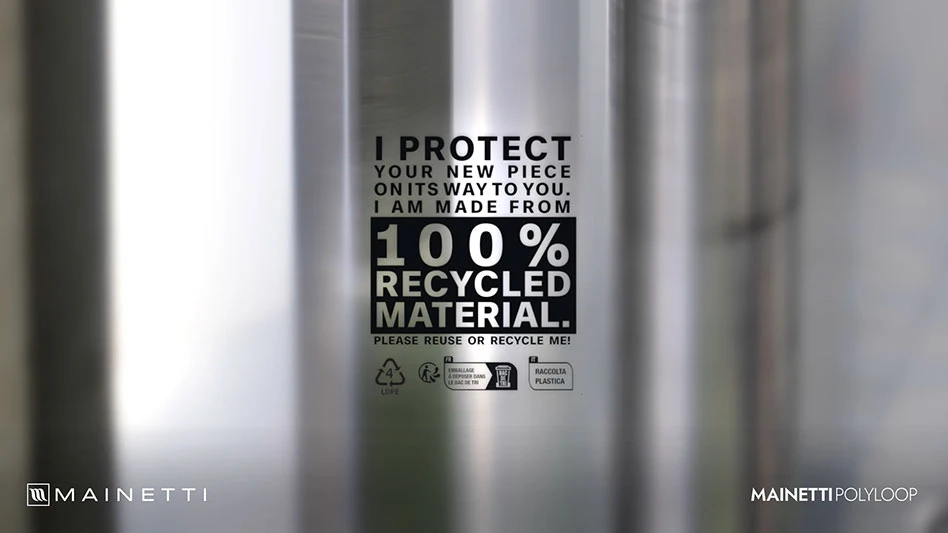
Photo by Recycling Today staff.
Presenters and panelists at several Bureau of International Recycling (BIR) 2021 World Recycling Convention sessions have made it clear to the BIR community that government scrutiny continues to be the order of the day when it comes to plastic scrap.
Individual nations, states and provinces continue to propose and pass legislation limiting the way plastic is used, or charging a fee to discourage its use in some applications. The BIR panelists, speaking in late May and early June, say that beyond that, policies being formulated at the United Nations and (UN) European Union level could make it difficult for manufacturers in some parts of the world to acquire the plastic scrap feedstock they need.
At the BIR’s May 31 “The Challenge” session, Emmanuel Katrakis, secretary general of the Brussels-based European Recycling Industries’ Confederation (EuRIC) referred to a sizable regulatory “tsunami” of potential new directives proposed by the EU in the wake of the Green Deal championed by the EU’s Commission (EC).
Some of these policies, indicated Katrakis, propose creating barriers in the international trade of secondary commodities (with plastic targeted at the forefront) between the EU and countries that are not part of the Paris-based Organization for Economic Cooperation and Development (OECD). There is additional concern about whether trade anywhere outside of the EU or even within the EU might face restrictions.
The Brussels-based BIR, EuRIC and other organizations may have only a few more months to influence the perceptions EC regulators and EU politicians have about scrap materials, which are still regulated as and referred to as “waste” in the EU.
Some of the same ground was covered in the meeting of the BIR’s International Environment Committee (IEC). That committee’s chair, Olivier François of Belgium-based Group Galloo, said the proposed EC changes to EU waste (scrap) shipment regulations could prove to be of “tremendous importance” and potentially highly damaging to the export flows of many recycled materials, including plastic.
One of the priorities established for the revision of the regulations is to restrict exports of materials designated as “waste,” even though this includes many sorted and processed materials well established as industrial feedstock.
Julia Blees, senior policy officer of EuRIC, said Europe generates surpluses of “quality secondary raw materials” that cannot all be absorbed by its domestic market. “We don’t think [scrap] shipments should be restricted even further.” François added that restrictions would lead to “tension” given that “many developing countries need the raw material.”
Both speakers said the key phrase in the new EC proposals is that users in importing countries should be operating under “broadly equivalent conditions” to those applying to scrap consumers in the EU, in terms of both human health and environmental protection. Blees said differentiation could be made between shipments to OECD and to non-OECD countries, as the former adhered to very similar standards to those applied in the EU.
Activist groups in Europe and beyond remain in favor of restricting plastic scrap cross-border trading, painting a picture of wealthier OECD nations sending their discarded materials to less-developed nations who take on the role of victims.
The United States-based Basel Action Network (BAN) issues a monthly “Plastic Waste Trade Watch” e-newsletter, with the subtitle “Turning back the toxic tide.” As the group’s name implies, it is among organizations in the U.S. urging their country to sign the Basel Convention, which formulates policies pertaining to cross-border shipments of materials including plastic scrap.
The BAN May 2021 e-newsletter includes a video clip with the title “Stop waste colonialism—because no place should be a dumping ground” and reports of plastic scrap shipments being seized in nations including Senegal, Tunisia and Turkey.
Whereas BIR or the Washington-based Institute of Scrap Recycling Industries (ISRI) would characterize the global plastic scrap trade as a willing buyer paying a considerable amount of money to receive raw materials from several hundred or several thousand miles away, BAN in its May e-newsletter uses the phrases “waste colonialism,” “waste disaster,” “illegal plastic wastes,” “regulatory loopholes” and “corruption.”
The language used by the recycling industry and its ability to communicate with politicians and the public is critical, said ISRI Vice President of Advocacy Adina Renee Adler at The Challenge session. She said ISRI and allied trade associations in Washington point to “three pillars” required to provide a counterbalance to advocacy groups who bash recycling: public relations, education and maintaining regulatory influence.
Articulating the recycling industry’s contributions both economically and environmentally has helped ISRI maintain a relationship with the federal and many state and local governments, Adler indicated.
As the EU and EC consider new policies that could greatly affect how recyclers operate on that continent, the need for industry voices to advocate that scrap materials are not waste or “toxic” is resoundingly clear.
Latest from Recycling Today
- Study highlights progress, challenges in meeting PCR goals for packaging
- Washington legislature passes EPR bill
- PureCycle makes progress on use of PureFive resin in film trials
- New copper alloy achieves unprecedented high-temperature performance
- Gränges boosts profits and sales volume in Q1 2025
- RMDAS April figures show recycled steel price setback
- Steer World offers PEX plastic recycling machine
- New recycling grant program launches in Massachusetts






